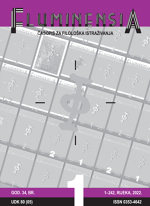THE NAZI CONCENTRATION CAMP SAN SABBA RICE MILL IN TRIESTE IN MEMORY AND LITERATURE PART ONE: REPRESSION OF THE UNCANNY
Keywords:
San Sabba Rice Mill, Holocaust, anti-fascism, communism, Claudio Magris, Daša DrndićAbstract
The paper deals with the collective memory of the San Sabba Rice Mill, a Nazi concentration camp that operated in Trieste from 1943 to 1945, through the analysis of two contemporary novels: Blameless by Claudio Magris and Sonnenschein by Daša Drndić. The first part presents basic historical data and various stages of memory, especially with regard to the proclamation of the national monument, the legal process for crimes committed in the camp, and the establishment of a museum. Particular attention is paid to the comparison of the San Sabba Rice Mill with the crimes committed by Yugoslav partisans during the liberation of Trieste in May 1945. This comparison has appeared in public space and collective memory more frequently since the time of the trial. Susanne C. Knittel’s research is presented, which, using the psychoanalytic concept of the uncanny, connects the repressed memory of Nazi euthanasia programs with that of the Slovenian and Croatian victims of the San Sabba Rice Mill. In the second part of the paper, these insights will be applied to the analysis of the two novels.

